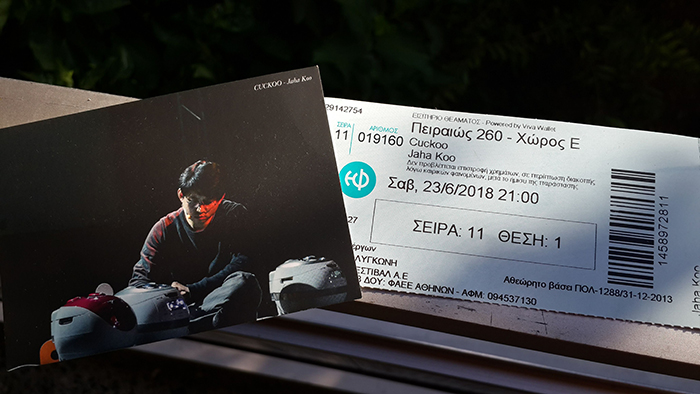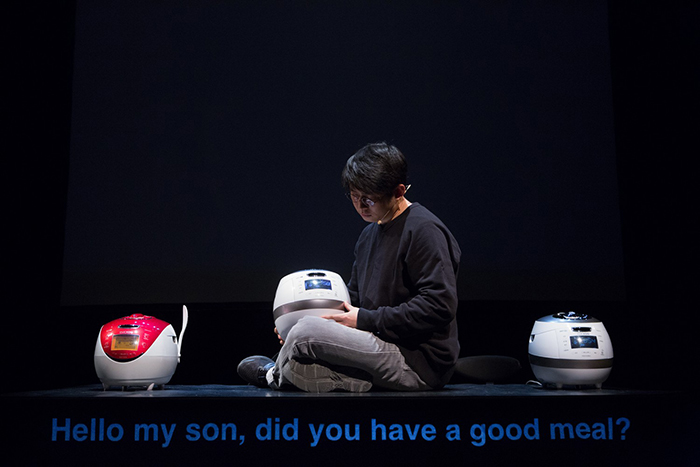View this article in another language
- 한국어
- English
- 日本語
- 中文
- العربية
- Español
- Français
- Deutsch
- Pусский
- Tiếng Việt
- Indonesian

Jaha Koo is performing at the 2018 Athens & Epidaurus Festival. (Katerina Lygkoni)
By Korea.net Honorary Reporter Katerina Lygkoni from Greece
The Athens & Epidaurus Festival is a leading public cultural event in Greece and among the most important cultural summer events in Europe. It has offered emblematic music, dance and theatricals from local and international artists for 62 years. Over the past few years, its aim has been to spotlight contemporary art. It is engaged in an open dialogue to create an active and thinking society about global issues.
According to two of the biggest media outlets in Greece, the AthensVoice and Lifo, the art performance “Cuckoo” by Korean artist Jaha Koo was described as, “One of the four shows of the 2018 festival not to be missed,” and “the most noteworthy” performance at this year's festival. Therefore, there was no way we could miss this performance, that was staged from June 22 to 24 at the Pireos 260 venue, a former industrial building next to the Athens School of Fine Arts.
Jaha Koo is a talented Korean theater performer and a music composer that lives and works in the Netherlands and Belgium. He majored in theater studies at the Korea National University of Arts in Seoul and studied at DasArts in Amsterdam. His performance “Cuckoo” is combined with diverse forms of multimedia, performance art, video, music, texts and installation art, called by the Athens Festival as a "performance-lecture."
What is a "performance-lecture"? Academia, artists themselves, art institutions and dictionaries all have various definitions, constantly evolving, according to the era in which it appears. However, there are some common features. An "art performance" is a 20th century modern art expression, around since the 1960s, where the materialistic object is not at the epicenter anymore. Rather, direct action is at the center. It's usually live, ephemeral and versatile, with the physical presence of the performance artist in front of the audience, and it can be laborious. Such "performance-lectures" address social and political issues and create strong feelings in the audience, often coming as a shock to them. Artistic virtue aims to make the audience think, rethink and open an indirect or direct dialogue.

Jaha Koo's performance is one of the most touching shows at this year's festival. (Radovan Dranga)
Jaha Koo’s performance tells of his personal experience with Korean political and historical events. He uses everyday objects, like three humanized steam rice cookers that are an integral part of the Korean household. However, he underlines the fact that his work is not only about "Korean" issues, per se, but that it's also apropos global issues, too. This is why his art is understood everywhere, despite focusing on personal accounts that took place in Korea through words, photos, videos and objects. This is why the audience at the Athens festival identified with the performance and understood it quite well.
The performance touches upon the 1997 East Asian financial crisis, the intervention of the International Monetary Fund (IMF), the subsequent social crisis, the strikes, the bloody demonstrations, the rise of the suicide rate (among them, one of his good friends), and forced migration. The Greek audience related to it as if it was the Greek crisis of a few years ago, step-by-step, even though it was placed in a different context.
There were so many similarities. There was laughter and emotion, but also a deep-thinking silence that led to a strong applause at the end of the performance, when Jaha Koo had to come out onto the stage three times for encores because of the emotional applause from the audience. Despite the stormy weather that evening in Athens, which caused many problems and an hour delay, a lot of people attended the show, among them many Greek artists and members of academia, including the head of the Athens festival.
In his interview with Greek journalists before the performance, he mentioned that this is the first time for him to show his performance in Greece, even though his work was inspired by the ancient Greek tragedies from where he borrowed the title of his trilogy, “Hamartia.” He also spoke about his favorite contemporary Greek movie, "Dogtooth," by director Yorgos Lanthimos, another source of inspiration.
The attention paid to his performance is such that he has now been invited to numerous other festivals around the world this year, in Taiwan, Germany, China, Norway and France. The Greek audience is looking forward to the third and final part of his theatrical trilogy "Hamartia," about the history of modern theater in Korea, in cooperation with Campo, the Belgium arts center, scheduled to be released in 2019.
Please visit the Athens & Epidaurus website here. You can also visit the artist's official website here.
wisdom117@korea.kr
* This article is written by a Korea.net Honorary Reporter. Our group of Honorary Reporters are from all around the world, and they share with Korea.net their love and passion for all things Korean.